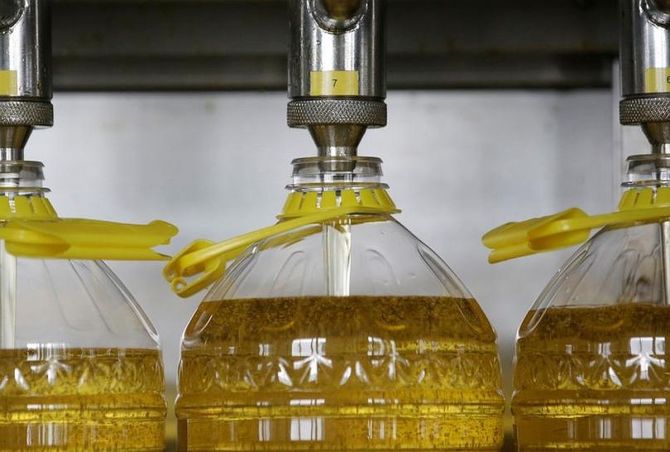The protesting farmers’ main demand to legalise the minimum support price (MSP) regime has divided opinion.

One school of thought says it would lead to crop diversification and help India keep under check its burgeoning import bill on edible oils and pulses, while another says it would incentivise farmers to produce low-quality crops.
Contrary to popular perception, India has a trade surplus in agriculture and allied activities, which stood at $18.65 billion during 2022-23 (FY23) against $15.92 billion in the previous year.
However, the surplus was mainly on account of rice, wheat, sugar, spices, and buffalo meat.
It was dragged down by vegetable oils and pulses, which India imported to meet the domestic demand.
The country had a $20.84 billion trade deficit in vegetable oils during FY23, up from $18.99 billion in the previous year.
The deficit was around three times as much during FY23, as against $7.2 billion 10 years ago.
This deficit during the year alone constituted 7.8 per cent of the total trade deficit India had, at $266.78 billion.
Price versus yield
The enormity of edible oil imports could be gauged from the fact that India was the top country to import this food stuff in the world in 2022, according to the United Nations trade statistics book.
India imports pulses too, but the trade deficit here is not as enormous as in edible oils.
The deficit here fell to $1.28 billion during FY24, against $1.87 billion the previous year.
The deficit remained less than $2 billion during the last five years each, but it had risen to as high as $4 billion during FY17. It had remained more than $2 billion during each of the first four years of the National Democratic Alliance government led by Prime Minister Narendra Modi that came to power in 2014.
Farmers are pressing for legalising MSP for all 23 crops, among their other demands.
But will legalising MSP, at least on pulses and oilseeds, lead to diversification of cultivation?
In response to a query, S Mahendra Dev, director and vice-chancellor of Indira Gandhi Institute of Development Research, says if procurement is there, farmers will diversify and shift to pulses and oilseeds only if the rate of return is equal or higher than that of rice and wheat.
“Otherwise, farmers won’t diversify,” he says.
However, Bank of Baroda Chief Economist Madan Sabnavis says the MSP does theoretically lead to diversification.
“We already have MSP every year and there is no need really to legalise it,” he points out.
The government does not have the machinery for procuring all the crops anyway, Sabnavis says, emphasising that the problem with MSP is that farmers will gravitate to the lowest acceptable quality and hence it can be counterproductive.
Dev, on the other hand, says the rate of return is dependent on the yield and price of the produce.
If you increase the MSP but the yield is low, farmers’ income will be low, he points out.
“So, we should have policies for both yield and price. Then people will shift to pulses and oilseeds. MSP takes care of the price, technology will take care of the yield,” Dev says.
Exporting water
Rice and wheat are grown on 58 per cent of the total land under foodgrain cultivation.
While rice was grown on 43.90 million hectares, wheat was grown on 30.28 million hectares (average of FY17 to FY21).
On the other hand, pulses were grown on 29.10 million hectares.
Major oilseeds were grown on 25.65 million hectares.
While area under pulses and oilseeds each is not much less than that under wheat, the yields are not comparable.
The yields are much higher in rice and wheat, compared to pulses and oilseeds.
This is so because rice and wheat are grown on irrigated land, while pulses and oilseeds are cultivated on mostly dry land.
The yield in rice was 2,607 kg per hectare (average of FY17 to FY21), and for wheat it was 3,384 kg per hectare.
On the other hand, the yield in major oilseeds was 1,242 kg per hectare and that in major pulses at 805 kg per hectare, according to data by the department of agriculture.
Dev says if the assured price is there, people will plant pulses and oilseeds on irrigated areas too.
Though the government does announce MSP for major pulses and oilseeds, there is very little procurement, and therefore it is meaningless.
That said, won’t increasing procurement of oilseeds and pulses disturb export markets for rice and wheat?
Dev says it will, but imports of pulses and oilseeds will come down. Rice, wheat, and sugarcane consume 80 per cent of the water used in agriculture and exporting these crops is like exporting water, he explains.
Diversification to pulses and oilseeds is not only good for soil and environment, but also for climate change.
If there is drought, these crops would be more resilient, he says, while emphasising that pulses and oilseeds are nutritionally good as well.











